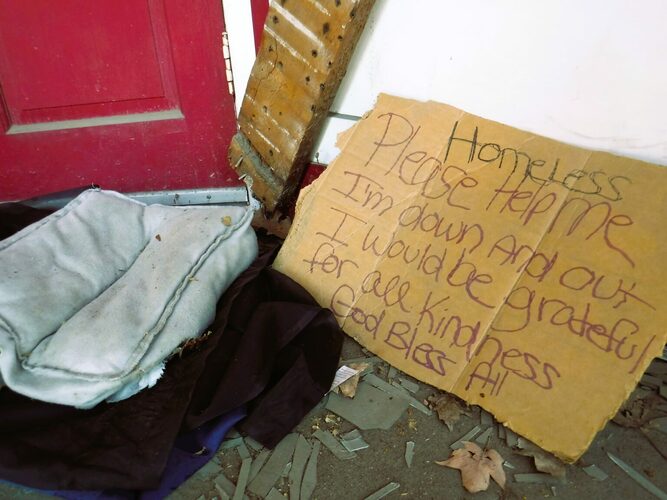BRATTLEBORO — On a recent hot morning outside the Quality Inn on Putney Road, Kayla and Travis are loading bags of clothing and small pieces of furniture into the back of a pickup truck.
They are part of the first wave of evictions from Vermont motels, after the end of the federally funded pandemic-era program that sheltered some 3,000 Vermonters (and around 270 people in Brattleboro) experiencing homelessness.
In Brattleboro, an informal group of local service providers, town administrators, and leaders from the faith community have been meeting to coordinate strategies to address the consequences of the program's end.
Though Anil Sachdev, the owner of the Quality Inn and four other motels in the state, has granted an additional 15 days' stay free in these properties to those slated to leave on June 1, it only delays the inevitability for many of returning to their precarious, pre-pandemic existence.
The benefits cliff
For Kayla and Travis, who have lived at the Quality Inn since January, this means camping at nearby Fort Dummer State Park.
“Once these 15 days are over, we have to go into the campground and we work full-time,” Kayla says.
Even though they will pay $388 for a two-week stay at the campground, she says it's still cheaper than staying at a local hotel, which would charge $800 per week.
Kayla works at Hannaford supermarket on Putney Road. Travis does landscaping when he can get work, and when he can't, he works at the Quality Inn.
“We make too much money for food stamps, so we can't pay $800 a week plus buy our food,” Kayla says.
How is it that a young, able-bodied, working couple is living like this?
“We're on waiting lists for apartments but we're not anywhere close to the top of the list,” Kayla says. “Every apartment I've filled out an application for, they've rejected us because we don't make 2{1/2} times what the rent is.”
Nearby, in an orange T-shirt and sunglasses, smoking a cigarette, stands Lafe.
“I don't know where I'm going after here,” he says. “Before I got here, I was camping out in the woods, sleeping on people's couches - a couple of friends of mine.”
Lafe says he lost his rental apartment this winter when he lost his job and now he can't get another job because he doesn't have a birth certificate or Social Security card.
“Plus I can't read or write,” he says. “You put a book in front of me, and I'm no good. But I'm good with my hands.”
Southeastern Vermont Community Action (SEVCA) assisted Lafe in getting into the motel housing program, and is helping him get new ID cards so that he can apply for work.
How does he eat?
“They got food shelves where you can get groceries, but here you only have a tiny fridge and a microwave and that's it,” he says.
Instead, he takes the MOOver bus downtown, where churches provide hot meals.
Those experiencing homelessness have a wide range of needs that local service providers, nonprofits, and churches attempt to address. Medical and mental health conditions, substance abuse, domestic violence, and lack of job skills all contribute to the condition of homelessness both locally and nationally.
In an effort to address what advocates are characterizing as the housing emergency created by the end of the motel housing program, the Vermont Agency of Human Services (AHS) is funding the development and implementation of transition plans for people leaving the motel program.
Additionally, AHS is requesting proposals from local leaders for projects to prevent and address “unsheltered homelessness.”
This term refers to situations in which people are not regularly accessing shelters or transitional housing programs and are, instead, sleeping in encampments, in vehicles, or in other locations not meant for human habitation.
Local groups strategize
The Community Homelessness Strategy Team has submitted a letter of interest, the first step in the proposal process, for funding and staffing a regional emergency shelter in a vacant office building in the area.
The team includes representatives from local and state government, Groundworks, Brattleboro Memorial Hospital, Health Care & Rehabilitation Services, the Windham Regional Commission, the Downtown Brattleboro Alliance, and area faith leaders, according to recent reporting from VTDigger.
The proposal also requests that the state designate state-owned and -managed land in the Brattleboro area as “emergency dispersed camping areas.”
This would allow for Fort Dummer and other state parks to accommodate more campers.
According to Town Manager John Potter, a member of the housing strategy team, the group is proposing that the state provide one year of funding for the emergency shelter for 100 people.
Groundworks Collaborative's overnight shelter provides beds for approximately 30 people nightly. Its Morningside House transitional shelter accommodated 30 people but remains closed in the aftermath of the death of its manager, Leah Rosin-Pritchard, at the hands of a guest on April 3.
“Most of the people coming out of the motels don't have solid transition plans, so a longer-term emergency shelter would be needed,” says Groundworks Executive Director Josh Davis.
But, according to Davis, in a recent phone call with Groundworks' staff, AHS Secretary Jenney Samuelson expressed that the state is not looking to “prop up” a Brattleboro shelter for the long term.
In a press conference last month, Samuelson said she expected some of the 2,500 people losing their emergency housing to “self-resolve” their lack of housing by the end of the program.
“Self-resolving,” says Davis, “means that more people will be camping in areas where they're not supposed to camp, will stay in unsafe, unsustainable housing situations, may stay with others as guests, thus putting others' housing at risk, and may put themselves in vulnerable situations where they are at risk of being exploited.”
